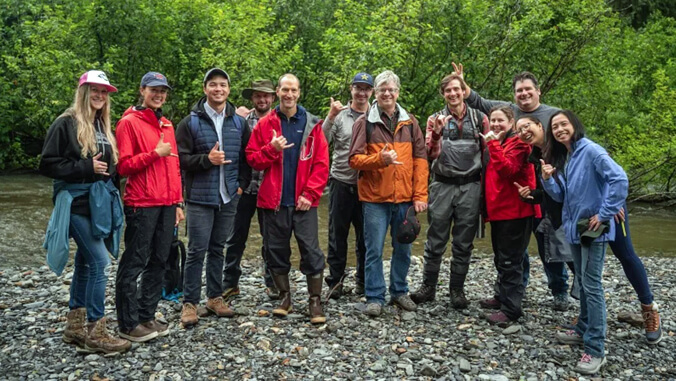
A group of marine scientists from the University of Hawaiʻi at Hilo and UH Mānoa traveled to Juneau, Alaska to exchange knowledge with fellow scientists in the 49th state in support of climate adaptation. The Hawaiʻi-Alaska collaboration provides a way for scientists and students to explore steep watershed ecosystems found in both locales that are seemingly different, but actually quite similar.
“Both locations [have] steep slopes and short river systems that rapidly transport watershed materials from the ridge to the ocean,” said Tracy Wiegner, a professor at UH Hilo’s Tropical Conservation Biology and Environmental Science program (TCBES). “Also, both locations receive a lot of rain and have rainforest vegetation. We noticed that our raincoats, which claim to be waterproof, only stayed dried for a while in Juneau; this also occurs in Hawaiʻi when we have torrential rain.”
The cross-regional research is being conducted through Pacific Island and Alaska Climate Adaptation Science Centers (CASC) located in Hilo and Juneau. The nine regional U.S. Geological Survey CASCs—located on the continental U.S.—are focusing on regional challenges through collaborative programs that team scientists with natural and cultural resource managers and local communities to help fish, wildlife, water, land and people adapt to a changing climate.
Wiegner joined UH Hilo marine sciences colleagues Steven Colbert, an associate professor; Tim Grabowski, adjunct associate professor; and TCBES graduate student Walter Boger. Participants from UH Mānoa included ecologist Yin-Phan Tsang from the Natural Resources and Environmental Management (NREM) program and graduate students; Yu-Fen Huang (NREM) and Dannielle Bartz (marine biology and Hawaiʻi Cooperative Fishery Research Unit).
The Hawaiʻi group observed salmon research in Alaskan watersheds and compared methodologies on cross-regional projects as part of the Pacific Islands-Alaska CASC collaboration. On Oʻahu, similar studies examining invasive suckermouth catfish are underway.
This joint research is one of several linked projects that the group of researchers, students and staff from the two climate centers discussed in late July 2022 at the Juneau Forestry Sciences Laboratory. The groups shared findings, compared fieldwork sites and methods, and discussed a shared vision for the collaboration.
Scientists working on the project hope to learn from each other on how to best support community-based adaptation efforts through research and communication in the two regions.

